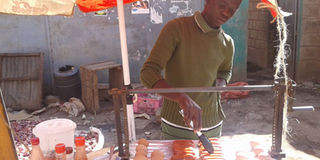Roasting smokies pays my bills

Samwel Ngochi at his open-air-cooking stall where he ekes out a living by roasting and selling smokies on the edges of Langata’s Ngei Phase Two estate in Nairobi. PHOTO | PHILIP MAOSA
What you need to know:
- While his job requires basic culinary skills, Ngochi is a strong believer in education as being key to a better and self-sustaining life. As such, the entrepreneur is pursuing a diploma in Education at Embu College.
- Initially, he only sold smokies but later on diversified his menu by adding boiled eggs to boost profits.
- Samwel’s customer base has been growing exponentially courtesy of his simple but effective marketing strategies that include giving an occasional free smokie or egg to his regular customers.
Samwel Ngochi repeatedly pours buckets of water on a section of the dusty road on which he operates an open-air-cooking stall to prevent dust from getting into his wares.
Satisfied that the place is dust-free, he lights up a charcoal stove and gently places the rolls of smokies on an aluminium foil to roast as he fans the burner. The job that feeds the 22-year-old man and pays his bills has just begun.
Samwel is among the youth who have refused to become part of Kenya’s soaring unemployment statistics by creating their own jobs, albeit on a small scale.
He ekes out a living by roasting and selling smokies on the edges of Langata’s Ngei Phase Two estate in Nairobi.
Previously, he was employed at the same job for six months, earning a Sh200 wage a day, before buying out his employer— a close friend of his.
“He left and sold the stove and the space to me at Sh10,000,” Samwel recalls, his face beaming with happiness.
BASIC CULINARY SKILLS
Initially, he only sold smokies but later on diversified his menu by adding boiled eggs to boost profits.
A smokie goes for Sh25 and he sells two, 22-piece packets every day— raking in Sh1,100 daily and Sh7,700 weekly. On the same wavelength, he sells 20-25 boiled eggs daily at Sh20 per egg, making about Sh500.
However, on a busy day, such as Sunday, customers consume four to five packets of smokies and one and a half 30-egg crates— making Sh3,300 a day.
He buys the smokies from Farmers’ Choice company at Sh330 per packet and makes a Sh220 profit on every packet. He spends Sh150 daily on onions, tomatoes, dhania and pepper.
Since he starts cooking at 2pm till 9pm, the Nairobi City County government categorises Samwel as a hawker and charges him a daily levy of Sh30.
While he wishes to operate from morning to evening, the county government would require him to have a licence— something he can’t afford for now.
Samwel’s customer base has been growing exponentially courtesy of his simple but effective marketing strategies that include giving an occasional free smokie or egg to his regular customers.
He says he likes his job because he is his own boss. Roasting and selling smokies is also stress-free and he makes money every day— at least Sh500.
While his job requires basic culinary skills, Ngochi is a strong believer in education as the key to a better and self-sustaining life. As such, the entrepreneur is pursuing a diploma in Education at Embu College.
“Business ends but education does not,” he says emphatically as he turns the smokies on the smoking-hot foil.
He pays fees with the money he saves every week with two chamas. He contributes Sh300 and Sh100 every seven days to the six-member and four-member groups, respectively.
Samwel is not the only young man living off his brain and sweat. Samwel Peter also hums the same tune.
LUCRATIVE VENTURE
He started out roasting smokies at a city hotel where he was earning a paltry Sh150 per day. Three months into the job, he realized that it was a lucrative venture, nudging him to branch out.
Like Samwel, Peter’s is chief product is smokie but he also sells bread and boiled eggs.
“I want to add chapatis,” he says.
The third-born in a family of four empties three packets of smokies (Sh1,650) and 30 eggs daily. One smokie goes for Sh25 whereas an egg sells at Sh20. A combination of bread (six slices) and a smokie is Sh50.
According to Peter, cleanliness is one of their trade secrets.
“Customers look at how clean the place is and also how you talk to them,” he says.
With only one year on the job, the husband of one, has bought two goats, rented a garden and is planning to build a house.
Samuel and Peter believe self-employment is the way to go for the youth.
They advise their jobless peers to take the loans that the Jubilee government rolled out last year through Uwezo Fund and set up businesses.
“It is not good to stay idle. There are many jobs that people can do instead of stealing from others,” Samwel advises.
This can be used as utility
The challenges they face:
1. Bad debts from defaulting customers.
2. Lack of space: Whenever it rains, dirty water from the trench adjacent to Samwel’s food stall overflows, flooding the whole place and forcing him to close the shop.
3. The wrappers Samwel uses to serve the smokies to customers are not enough, which compels him to use nylon papers that customers don’t like.





